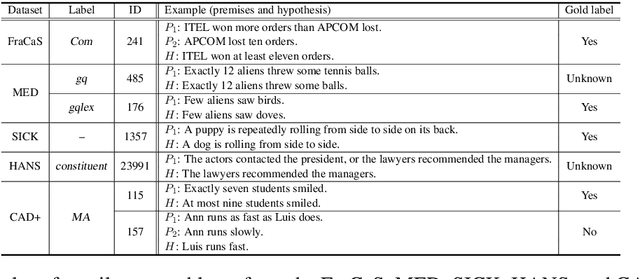Izumi Haruta
Combining Event Semantics and Degree Semantics for Natural Language Inference
Nov 02, 2020



Abstract:In formal semantics, there are two well-developed semantic frameworks: event semantics, which treats verbs and adverbial modifiers using the notion of event, and degree semantics, which analyzes adjectives and comparatives using the notion of degree. However, it is not obvious whether these frameworks can be combined to handle cases in which the phenomena in question are interacting with each other. Here, we study this issue by focusing on natural language inference (NLI). We implement a logic-based NLI system that combines event semantics and degree semantics and their interaction with lexical knowledge. We evaluate the system on various NLI datasets containing linguistically challenging problems. The results show that the system achieves high accuracies on these datasets in comparison with previous logic-based systems and deep-learning-based systems. This suggests that the two semantic frameworks can be combined consistently to handle various combinations of linguistic phenomena without compromising the advantage of either framework.
Logical Inferences with Comparatives and Generalized Quantifiers
May 16, 2020



Abstract:Comparative constructions pose a challenge in Natural Language Inference (NLI), which is the task of determining whether a text entails a hypothesis. Comparatives are structurally complex in that they interact with other linguistic phenomena such as quantifiers, numerals, and lexical antonyms. In formal semantics, there is a rich body of work on comparatives and gradable expressions using the notion of degree. However, a logical inference system for comparatives has not been sufficiently developed for use in the NLI task. In this paper, we present a compositional semantics that maps various comparative constructions in English to semantic representations via Combinatory Categorial Grammar (CCG) parsers and combine it with an inference system based on automated theorem proving. We evaluate our system on three NLI datasets that contain complex logical inferences with comparatives, generalized quantifiers, and numerals. We show that the system outperforms previous logic-based systems as well as recent deep learning-based models.
A CCG-based Compositional Semantics and Inference System for Comparatives
Oct 02, 2019



Abstract:Comparative constructions play an important role in natural language inference. However, attempts to study semantic representations and logical inferences for comparatives from the computational perspective are not well developed, due to the complexity of their syntactic structures and inference patterns. In this study, using a framework based on Combinatory Categorial Grammar (CCG), we present a compositional semantics that maps various comparative constructions in English to semantic representations and introduces an inference system that effectively handles logical inference with comparatives, including those involving numeral adjectives, antonyms, and quantification. We evaluate the performance of our system on the FraCaS test suite and show that the system can handle a variety of complex logical inferences with comparatives.
 Add to Chrome
Add to Chrome Add to Firefox
Add to Firefox Add to Edge
Add to Edge